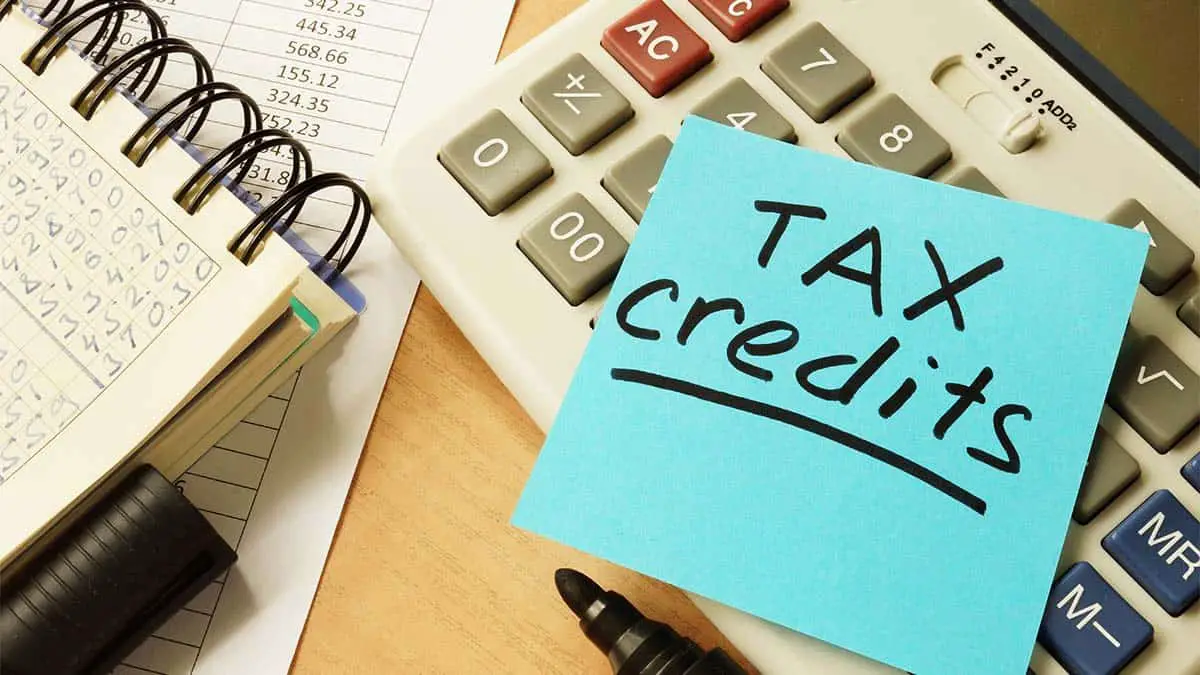The Commercial Clean Vehicle Tax Credit offers a valuable incentive for businesses to invest in environmentally friendly transportation options such as electric vehicles. This tax credit is designed to provide financial relief to companies that purchase qualified clean vehicles.
Under the provisions of the Internal Revenue Code (IRC) 45W, businesses and tax-exempt organizations can qualify for a clean vehicle tax credit of up to $40,000 when they purchase a qualified commercial clean vehicle.
To take advantage of this tax credit, businesses must first understand the criteria for eligibility, the various thresholds based on vehicle weight, and the application process.

Overview of Commercial Clean Vehicle Tax Credit
The Commercial Clean Vehicle Tax Credit is a financial incentive for businesses looking to adopt clean energy vehicles, such as electric cars (EVs), or fuel cell vehicles (FCEVs).
This tax credit can assist businesses and tax-exempt organizations in saving money by providing a credit of up to $40,000 under the Internal Revenue Code (IRC) 45W.
The amount of the tax credit is determined by the lesser of: 15% of the basis in the vehicle (30% if the vehicle is not powered by gas or diesel) or the incremental cost of the vehicle.
It is important to note that there are additional restrictions imposed by the IRS, which include monitoring the credits by their Vehicle Identification Number (VIN).
The Inflation Reduction Act of 2022 also made several changes to clean vehicle credits for new, previously owned, and commercial clean vehicles.
The U.S. Treasury Department and IRS have since released information on certain clean vehicle provisions, which are designed to provide consumers and businesses with access to tax benefits from the law’s clean vehicle provisions.
Eligible vehicles include those that meet specific criteria, including two gross vehicle weight rating (GVWR) categories of less than 14,000 pounds or over 14,000 pounds.
Businesses interested in taking advantage of the Commercial Clean Vehicle Tax Credit should ensure they understand all of the requirements and limitations set forth by the IRS and the Inflation Reduction Act of 2022.
Eligibility Criteria
Who Qualifies For The Commercial Clean Vehicle Tax Credit?
Businesses and tax-exempt organizations qualify for the Commercial Clean Vehicle Tax Credit.
No limit has been placed on the number of Commercial Clean Vehicle Credits a business or tax-exempt organization may claim.
Qualified Commercial Clean Vehicles
To be eligible for the Commercial Clean Vehicle Tax Credit, businesses and tax-exempt organizations must purchase a qualified commercial clean vehicle.
A qualified commercial clean vehicle must meet all necessary federal standards for clean energy vehicles. These vehicles mainly include electric vehicles (EVs) and fuel cell vehicles (FCVs), which are powered by batteries or fuel cells respectively.
Qualified Manufacturers
Only vehicles produced by qualified manufacturers are eligible for this tax credit. A manufacturer is considered qualified if they comply with federal regulations and guidelines for producing clean energy vehicles. Buyers should ensure that the manufacturer of their chosen vehicle meets the eligibility criteria before making a purchase.
Gross Vehicle Weight Rating Requirements
In addition to the type of vehicle and its manufacturer, the Gross Vehicle Weight Rating (GVWR) also plays a vital role in determining eligibility for the tax credit. There are two GVWR thresholds for the tax credit:
- Vehicles with a GVWR less than 14,000 pounds qualify for up to $7,500 in tax credits.
- Vehicles with a GVWR greater than 14,000 pounds qualify for up to $40,000 in tax credits.
Businesses and tax-exempt organizations should verify their vehicle’s GVWR prior to purchase to ensure it meets the necessary requirements.

Credit Amount and Calculations
New Clean Vehicle Credit
As stated above, the vehicle’s weight is a factor when calculating the credit amount: those weighing less than 14,000 pounds qualify for up to $7,500, while those weighing more than 14,000 pounds qualify for up to $40,000. The credit equals the lesser of 15% of your basis in the vehicle (30% if the vehicle is not powered by gas or diesel) or the incremental cost of the vehicle.
Incremental Cost
The incremental cost of a clean vehicle is the difference between the cost of the clean vehicle and the cost of a comparable vehicle that runs on gasoline or diesel fuel. This cost helps determine the credit amount and is used to calculate the tax credit for the qualified commercial clean vehicle.
Nonrefundable Credit Limitations
It is essential to note that the clean vehicle tax credit is nonrefundable, meaning it cannot exceed the business owner’s tax liability, and any unused portion of the credit cannot be carried forward or refunded. However, it can be used to offset other tax liabilities, such as the alternative minimum tax.
Claiming the Commercial Clean Vehicle Credit
How do businesses claim the EV tax credit?
Businesses and tax-exempt organizations looking to claim the commercial electric vehicle (EV) tax credit can do so by following the guidelines set forth by the Internal Revenue Service (IRS). The credit, governed by the Internal Revenue Code (IRC) 45W, is available for those who purchase or lease qualified electric vehicles for business use.
Required Forms and Documentation
In order to claim the EV tax credit, the IRS is preparing a form which at the time of writing, is not yet finalised. See the IRS website for updates.
The full details of the form are currently unknown however it’s likely to entail information about the purchased or leased vehicle, such as the make and model, date of acquisition, and the vehicle’s battery capacity.
Additionally, businesses should retain documentation supporting their claim, including sales invoices, lease agreements, and proof of payment.
Businesses and tax-exempt organizations interested in claiming the commercial clean vehicle credit under IRC 45W should consult their tax professional or the IRS to ensure they understand the specific requirements and documentation necessary to qualify for this credit.
Impact on Depreciation and Basis
Basis Reduction for Tax Credits
When a business claims the Commercial Clean Vehicle Tax Credit, it must reduce its basis in the vehicle by the amount of the credit received.
For example, if a company purchases a qualified commercial clean vehicle for $100,000 and receives a $15,000 tax credit, the basis in the vehicle will be reduced to $85,000.
This reduction in basis ensures that the tax credit does not result in double tax benefits, as a higher basis would lead to larger depreciation deductions.
The reduced basis in the vehicle will affect the calculation of depreciation allowances for the company over the life of the vehicle.
Critical Minerals and Battery Component Requirements
Battery Component Requirement
The battery component requirement is an essential aspect of the Commercial Clean Vehicle Tax Credit for businesses. To meet this requirement, electric vehicles need to have a battery capacity that satisfies specific criteria.
This battery capacity is calculated based on a base amount of $2,500, with an additional $417 for a battery with a capacity of 5 kilowatt hours and an additional $417 for each kilowatt hour of capacity in excess of 5 kilowatt hours according to the Treasury.
This capacity requirement helps ensure that vehicles qualifying for the tax credit are designed with batteries that have a sufficient energy storage and can contribute to a cleaner environment under the Clean Air Act.
Critical Minerals Requirement
Alongside the battery component requirement, the Commercial Clean Vehicle Tax Credit also considers the critical minerals requirement.
Critical minerals are essential for the production of electric motors and other clean energy technologies. To qualify for the credit, vehicles must meet specific requirements concerning the use and sourcing of critical minerals, as prescribed in the Inflation Reduction Act (IRA).
Vehicles may receive a maximum credit of $7,500 per vehicle, consisting of $3,750 for meeting the critical minerals requirement and an additional $3,750 for meeting the battery components requirement. The critical mineral and battery components requirements apply to vehicles placed in service on or after April 18, 2023, as stated by the IRS.
Businesses and tax-exempt organizations that meet both the critical mineral and battery component requirements can qualify for a clean vehicle tax credit of up to $40,000 under Internal Revenue Code (IRC) 45W as reported by the IRS.
This credit encourages manufacturers to invest in critical minerals and battery technologies, driving innovation and promoting cleaner energy solutions for commercial transportation.

Vehicle Lease and Financing Considerations
When businesses consider acquiring commercial clean vehicles, various factors come into play, including lease agreements, tax ownership, and credit allocation. This section discusses the essential factors to consider in vehicle lease and financing for clean vehicles to make informed decisions.
Lease Agreements and Tax Credits
Lease agreements play a crucial role in determining eligibility for clean vehicle tax credits. Businesses planning to lease commercial clean vehicles should ensure that the lease terms are compatible with tax credit requirements.
Typically, the leasing party must have the legal rights to the vehicle, possess the vehicle identification number (VIN), and maintain a written agreement specifying the lease terms, including the purchase price of the vehicle.
It’s essential to note that the tax credit amount varies depending on the type and specs of the commercial vehicle. Businesses should be aware of the qualified commercial clean vehicle credit they can claim based on the specific vehicle leased to plan their finances accordingly.
Tax Ownership and Credit Allocation
Tax ownership is a decisive factor in determining who can claim the clean vehicle tax credit. In the case of leased commercial vehicles, the lessor is usually considered the tax owner and can claim the credit. However, the lessor may allocate the tax credit to the lessee under certain circumstances.
To allocate the credit effectively, clear and written terms should be included in the lease agreement. Businesses should consult with tax professionals to understand the tax ownership and credit allocation implications specific to their lease structure and business situation.
Resources and Assistance
When it comes to understanding and taking advantage of the Commercial Clean Vehicle Tax Credit for businesses, there are a few key resources and sources of assistance that can help.
Internal Revenue Service Guidance
The Internal Revenue Service (IRS) is the primary source of information for the Commercial Clean Vehicle Tax Credit. They provide comprehensive guidance on the credit, including eligibility requirements, credit amounts, and relevant tax forms. Businesses and tax-exempt organizations can refer to the IRS FAQs on qualified commercial clean vehicles for answers to common questions, or seek advice from a tax professional.
Industry Experts and Consultants
Industry experts and consultants, such as KPMG, can provide additional insights and tailored advice on how the Commercial Clean Vehicle Tax Credit may benefit a particular business. They can help companies navigate the complex tax code, identify the best clean vehicle options, and ensure they are maximizing the available tax benefits while staying compliant with relevant regulations.
Frequently Asked Questions
What are the eligibility criteria for the commercial clean vehicle tax credit?
To be eligible for the commercial clean vehicle tax credit, businesses and tax-exempt organizations must purchase and place a qualified commercial clean vehicle into service within their business during the taxable year. The vehicle must be used for business purposes, and the credit amount is determined based on the lesser of 15% of the basis in the vehicle (30% if the vehicle doesn’t use gas or diesel) or the incremental cost of the vehicle.
Can the tax credit be applied to Tesla vehicles?
Yes, the commercial clean vehicle tax credit can be applied to Tesla vehicles as long as they meet the eligibility criteria mentioned above. This includes being a qualified commercial clean vehicle and being used for business purposes.
What is the maximum amount of tax credit businesses can receive?
Businesses can receive a maximum commercial clean vehicle tax credit of up to $40,000 under Internal Revenue Code (IRC) 45W.
What types of vehicles qualify for the commercial clean vehicle tax credit?
A “qualified commercial clean vehicle” refers to a vehicle that meets specific criteria set by the Internal Revenue Service (IRS) related to energy efficiency and emissions standards. The IRS provides detailed information on the definition of a qualified vehicle in their FAQ section on commercial clean vehicle credits.
How has the commercial clean vehicle tax credit changed for 2023?
For 2023, the IRS has issued guidance and updated frequently asked questions related to new, previously owned, and qualified commercial clean vehicle credits. Businesses and individuals can find the updated information in the Fact Sheet 2023-4. It’s essential to review these updates to ensure compliance and eligibility for the tax credit during the 2023 tax year.
- Tesla Charger Installation Cost (Home Setups) - March 1, 2024
- Tesla Phone Key Disconnected (Troubleshooting Guide and Quick Fixes) - March 1, 2024
- Tesla FSD 12 (Explained) - March 1, 2024